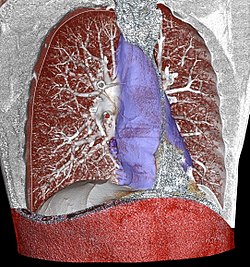Mediastinitis
(Redirected from Mediastinal fibrosis)
Inflammatory process affecting the mediastinum
| Mediastinitis | |
|---|---|

| |
| Synonyms | |
| Pronounce | |
| Field | |
| Symptoms | |
| Complications | |
| Onset | |
| Duration | |
| Types | |
| Causes | |
| Risks | |
| Diagnosis | |
| Differential diagnosis | |
| Prevention | |
| Treatment | |
| Medication | |
| Prognosis | |
| Frequency | |
| Deaths | |
An inflammatory process affecting the mediastinum.
Types
Mediastinitis can be acute or chronic, depending on the onset.
Risk factors
It most often occurs in person who recently had an upper endoscopy or chest surgery.
- A person may have a tear in their esophagus that causes mediastinitis.
- Disease of the esophagus
- Diabetes mellitus
- Problems in the upper gastrointestinal tract
- Recent chest surgery or endoscopy
- Weakened immune system
Causes
Causes of the tear include:
- A procedure such as endoscopy
- Forceful or constant vomiting
- Trauma
- A fungal infection called histoplasmosis
- Radiation
- Inflammation of the lymph nodes, lungs, liver, eyes, skin, or other tissues (sarcoidosis)
- Tuberculosis
- Breathing in anthrax
- Cancer
Signs and symptoms
- Chest pain
- Chills
- Fever
- General discomfort
- Shortness of breath
Signs of mediastinitis in people who have had recent surgery include:
- Chest wall tenderness
- Wound drainage
- Unstable chest wall
Investigations
Tests may include:
- Chest CT scan or MRI scan
- Chest x-ray
- Ultrasound
- MRI of the chest
Treatment
You may receive antibiotics if you have an infection.
You may need surgery to remove the area of inflammation if the blood vessels, windpipe, or esophagus is blocked.
Prognosis
- How well a person does depends on the cause and severity of the mediastinitis.
- Mediastinitis after chest surgery is very serious. There is a risk of dying from the condition.
Complications
Complications include the following:
- Spread of the infection to the bloodstream, blood vessels, bones, heart, or lungs
- Scarring - Scarring can be severe, especially when it is caused by chronic mediastinitis. Scarring can interfere with heart or lung function.
Prevention
- To lessen the risk of developing mediastinitis related to chest surgery, surgical wounds should be kept clean and dry after surgery.
- Treating tuberculosis, sarcoidosis, or other conditions associated with mediastinitis may prevent this complication.
Alternative Names: Chest infection
External links
- Mediastinitis at the US National Library of Medicine Medical Subject Headings (MeSH)
| Diseases of the respiratory system | ||||||||||||||||||||||||||||||||||||||
|---|---|---|---|---|---|---|---|---|---|---|---|---|---|---|---|---|---|---|---|---|---|---|---|---|---|---|---|---|---|---|---|---|---|---|---|---|---|---|
|
Transform your life with W8MD's budget GLP-1 injections from $125.
W8MD offers a medical weight loss program to lose weight in Philadelphia. Our physician-supervised medical weight loss provides:
- Most insurances accepted or discounted self-pay rates. We will obtain insurance prior authorizations if needed.
- Generic GLP1 weight loss injections from $125 for the starting dose.
- Also offer prescription weight loss medications including Phentermine, Qsymia, Diethylpropion, Contrave etc.
NYC weight loss doctor appointments
Start your NYC weight loss journey today at our NYC medical weight loss and Philadelphia medical weight loss clinics.
- Call 718-946-5500 to lose weight in NYC or for medical weight loss in Philadelphia 215-676-2334.
- Tags:NYC medical weight loss, Philadelphia lose weight Zepbound NYC, Budget GLP1 weight loss injections, Wegovy Philadelphia, Wegovy NYC, Philadelphia medical weight loss, Brookly weight loss and Wegovy NYC
|
WikiMD's Wellness Encyclopedia |
| Let Food Be Thy Medicine Medicine Thy Food - Hippocrates |
Medical Disclaimer: WikiMD is not a substitute for professional medical advice. The information on WikiMD is provided as an information resource only, may be incorrect, outdated or misleading, and is not to be used or relied on for any diagnostic or treatment purposes. Please consult your health care provider before making any healthcare decisions or for guidance about a specific medical condition. WikiMD expressly disclaims responsibility, and shall have no liability, for any damages, loss, injury, or liability whatsoever suffered as a result of your reliance on the information contained in this site. By visiting this site you agree to the foregoing terms and conditions, which may from time to time be changed or supplemented by WikiMD. If you do not agree to the foregoing terms and conditions, you should not enter or use this site. See full disclaimer.
Credits:Most images are courtesy of Wikimedia commons, and templates, categories Wikipedia, licensed under CC BY SA or similar.
Translate this page: - East Asian
中文,
日本,
한국어,
South Asian
हिन्दी,
தமிழ்,
తెలుగు,
Urdu,
ಕನ್ನಡ,
Southeast Asian
Indonesian,
Vietnamese,
Thai,
မြန်မာဘာသာ,
বাংলা
European
español,
Deutsch,
français,
Greek,
português do Brasil,
polski,
română,
русский,
Nederlands,
norsk,
svenska,
suomi,
Italian
Middle Eastern & African
عربى,
Turkish,
Persian,
Hebrew,
Afrikaans,
isiZulu,
Kiswahili,
Other
Bulgarian,
Hungarian,
Czech,
Swedish,
മലയാളം,
मराठी,
ਪੰਜਾਬੀ,
ગુજરાતી,
Portuguese,
Ukrainian
Contributors: Prab R. Tumpati, MD



